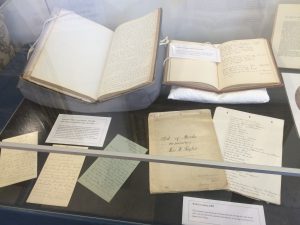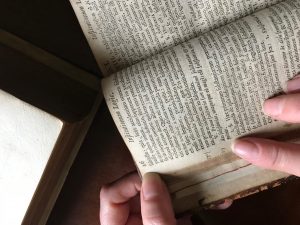An “unauthorized autobiography” of the British philosopher John Stuart Mill has emerged from scribbles, doodles and other jottings in the margins of his personal library, giving a glimpse of the anxious child-scholar who learned Latin and Greek by the age of eight.
Mill, arguably the pre-eminent English-speaking philosopher of the 1800s, annotated extensively as he read. The notes provide a fuller portrait of a towering intellect who jousted with fellow thinkers.
“Having access to Mill’s unvarnished reactions to his reading is as close as we will ever get to witnessing one of history’s foremost minds in the process of thinking,” said Dr Albert Pionke, a specialist in Victorian literature and culture who is leading the work of digitizing the marginalia.
“Being able to watch this groundbreaking philosopher, political theorist and critic at work has simply never been possible before, and should serve as a virtual gold mine for scholars of John Stuart Mill.”
The borders of Mill’s 1700-volume collection, which is held at Somerville College, Oxford, include a vigorous response to his one-time friend Thomas Carlyle’s attack, in “Hudson’s Statue,” on efforts to memorialize one of the most notorious financial frauds of the nineteenth century, the British railway financier George Hudson.
Writing a year after Hudson’s business had collapsed, Carlyle had been pontificating about the need to choose one’s heroes carefully – a principle that he asserted was threatened by England’s liberal path towards popular sovereignty.
In his margin writing, Mill shows doubt about whether the efforts of a few “fools” to honour Hudson warranted Carlyle’s apocalyptic warnings about the threat of extending suffrage.
In neatly handwritten pencil, Mill declares in the borders of Carlyle’s pamphlet “all the world knows – except the fools + they don’t count – all his mistake is in counting the fools.”
The collection contains a copy of the influential “Democracy in America” by French social theorist Alexis de Tocqueville, who inscribed volumes three and four, published in 1840, “in friendship” to “John Mill.”
At the end of a chapter entitled, “Some Reflections on American Manners,” Mill wonders, in a handwritten endnote, “How is it possible for one confessedly ignorant of England to say what is, and what is not, really American in their manners?”
He also took the opportunity to record his dismissal of the American writer and thinker Ralph Waldo Emerson. Emerson’s “Essays,” published in 1841, helped launch him to international attention, but Mill’s thoughts of the work are summarized in his own rewrite of the title in his copy of the book, “Sentimental Essays in the Art of Intimately blending Sense and Nonsense.”
That discovery, first published by historian Frank Prochaska in 2013, led Somerville librarians to put out a call for a scholar to sift and archive more of the Mill collection. Pionke, a Victorian specialist at the University of Alabama, responded, and the partnership formed.
Elsewhere, his marginalia also reveals a touching portrait of the child who was taught Greek, Latin, logic and political economy under the stern tutelage of his father James Mill. A clear indication of this is given in Mill’s copy of Franco Burgersdijk’s Institutionum Logicarum – a work of neo-Aristotelian “school philosophy” still used as a textbook on logic by Oxbridge undergraduates well into the eighteenth century.
Over 500 numbers have been hand-written in the margin of this book, suggesting that Mill had created a running index of the book’s contents which would help him answer his father’s searching questions. The book also features a handful of more juvenile looking doodles including a triangle and a fan-shaped squiggle – possibly an indication of rebellious relief by the young Mill, who was still only twelve at the time.
The collection was donated to Somerville College, Oxford by Mill’s step daughter Helen Taylor in 1905. The College has launched a project to ensure that the library is available to researchers and members of the public for years to come. This includes work to preserve and, where necessary, repair volumes in the collection.
Although prior scholars, including Frank Prochaska, William Peterson, Fred Stanley and Edward Alexander, have scrutinized individual books from Mill’s library, Pionke’s work at Somerville College represents the most wide-ranging examination yet of the Mill marginalia. The search has uncovered dozens of different kinds of marginalia including question marks, chevrons, arrows, seven types of scores – and even a single musical note, which appears in the margin of Burgersdijk’s book.
By making the marginalia in Somerville’s John Stuart Mill Collection accessible and searchable anywhere in the world on MillMarginalia.org, Pionke hopes to use Mill’s own words and myriad nonverbal marks to return him to virtual life.
So far, Mill Marginalia Online contains close to 10,000 marks from about 200 books. Pionke estimates that five times as many nonverbal marks and verbal annotations will eventually emerge from the entire collection.
Mill lived through one of the most turbulent periods of British history and his thoughts written on the margins are uncensored reactions to his time.
Pionke said: “Recovering his marginalia, then, not only gives us unfiltered access to one of the nineteenth century’s foremost philosophical, political, and social thinkers, it also provides an unprecedented window on the larger cohort of writers, ideas, and political events that shaped Victorian England itself.”
Dr Anne Manuel, the College Librarian and Archivist, said: “The College is delighted by Dr Pionke’s work in digitizing the marginalia of the Mill library, creating an invaluable resource for scholars around the world. We hope that this work will not only illuminate Mill’s own life and opinions but contribute to a deeper understanding of the intellectual life of his era.”

